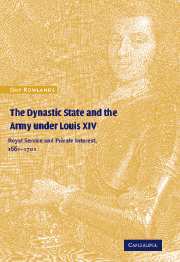Book contents
- Frontmatter
- Contents
- List of maps
- Acknowledgements
- List of abbreviations
- Family tree of the Le Tellier: 1. Principal branch
- Family tree of the Le Tellier: 2. Royal household marital connections
- Map 1 The French provinces under Louis XIV
- General introduction: ‘Absolute monarchy’, dynasticism and the standing army
- Part I ‘Patrimonial bureaucracy’: The Le Tellier dynasty and the Ministry of War
- Introduction
- 1 The Secretary of State for War and the dynastic interests of the Le Tellier family
- 2 The ebb and flow of Le Tellier power, 1661–1701
- 3 The use and abuse of servants: the Ministry of War, venality and civilian power in the army
- 4 Financing war: the treasury of the Extraordinaire des Guerres
- 5 Corruption and the pursuit of self-interest in the Ministry of War
- Part II The forging of the French officer corps and the standing army under Louis XIV
- Part III The high command of the French armies
- Conclusion: The preservation of the dynasty
- Appendix 1 Defining the grands
- Appendix 2 The proportion of revenue generated by the Extraordinaire des Guerres as a ‘primary receiver’
- Bibliography
- Index
- CAMBRIDGE STUDIES IN EARLY MODERN HISTORY
5 - Corruption and the pursuit of self-interest in the Ministry of War
Published online by Cambridge University Press: 20 May 2010
- Frontmatter
- Contents
- List of maps
- Acknowledgements
- List of abbreviations
- Family tree of the Le Tellier: 1. Principal branch
- Family tree of the Le Tellier: 2. Royal household marital connections
- Map 1 The French provinces under Louis XIV
- General introduction: ‘Absolute monarchy’, dynasticism and the standing army
- Part I ‘Patrimonial bureaucracy’: The Le Tellier dynasty and the Ministry of War
- Introduction
- 1 The Secretary of State for War and the dynastic interests of the Le Tellier family
- 2 The ebb and flow of Le Tellier power, 1661–1701
- 3 The use and abuse of servants: the Ministry of War, venality and civilian power in the army
- 4 Financing war: the treasury of the Extraordinaire des Guerres
- 5 Corruption and the pursuit of self-interest in the Ministry of War
- Part II The forging of the French officer corps and the standing army under Louis XIV
- Part III The high command of the French armies
- Conclusion: The preservation of the dynasty
- Appendix 1 Defining the grands
- Appendix 2 The proportion of revenue generated by the Extraordinaire des Guerres as a ‘primary receiver’
- Bibliography
- Index
- CAMBRIDGE STUDIES IN EARLY MODERN HISTORY
Summary
With colossal sums related to military spending floating around France – topping 20 million livres in peacetime in 1666 and over 100 million in the Nine Years War – the scope for fraud was a chronic headache for ministers. The scope for irregularity in French military administration was still, after 1661, alarmingly high and accountability was chronically weak. The first line of defence against fraud and corruption was presented by the intendants, but they were so overburdened it was difficult for them to monitor the activities of paymasters. In 1694 intendant Le Bret of Provence bewailed the fact that he could find only three to four hours each month to check the receipts and audit the accounts of the agents of the Extraordinaire des Guerres in Provence. The same pressure of time afflicted, on an even grander scale, the Secretary of State for War. The Chambre des comptes, supposedly the crown's financial watchdog and one of the superior courts of the realm, was under-resourced, decrepit and hidebound. Already by the 1560s it was grossly overloaded and the subsequent increases in its officers and magistrates failed to keep pace with further growth in government business all the way up to the Revolution. Needless to say, the staff of the Chambre, nearly all venal office-holders with plenty of investments in the fisco-financiers themselves, cannot be considered paragons of virtue either.
- Type
- Chapter
- Information
- The Dynastic State and the Army under Louis XIVRoyal Service and Private Interest 1661–1701, pp. 135 - 150Publisher: Cambridge University PressPrint publication year: 2002

